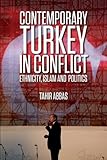Contemporary Turkey in Conflict : Ethnicity, Islam and Politics / Tahir Abbas.
Material type: TextPublisher: Edinburgh : Edinburgh University Press, [2022]Copyright date: ©2016Description: 1 online resource (216 p.) : 5 B/W illustrationsContent type:
TextPublisher: Edinburgh : Edinburgh University Press, [2022]Copyright date: ©2016Description: 1 online resource (216 p.) : 5 B/W illustrationsContent type: - 9781474417983
- 9781474418003
- DR603 .A23 2017
- online - DeGruyter
- Issued also in print.
| Item type | Current library | Call number | URL | Status | Notes | Barcode | |
|---|---|---|---|---|---|---|---|
 eBook
eBook
|
Biblioteca "Angelicum" Pont. Univ. S.Tommaso d'Aquino Nuvola online | online - DeGruyter (Browse shelf(Opens below)) | Online access | Not for loan (Accesso limitato) | Accesso per gli utenti autorizzati / Access for authorized users | (dgr)9781474418003 |
Frontmatter -- Contents -- Figures and Tables -- Preface -- Acknowledgements -- Chronology -- 1 Setting the Scene -- 2 Historicising Pluralism and Monoculturalism -- 3 Insights on Intolerance towards Minorities -- 4 Perspectives on the 'Kurdish Issue' -- 5 The Gezi Park Awakening -- 6 Exploring Trust in Society and Politics -- 7 Conclusions -- Postscript: 'A Gift from God' -- Appendix Notes on Methods -- References -- Index
restricted access online access with authorization star
http://purl.org/coar/access_right/c_16ec
Explores ethnicity, politics and Islam in Turkey in the 21st-centuryNew perspectives on ethnic relations, Islam and neoliberalism have emerged in Turkey since the rise of the Justice and Development Party (AKP) in 2002. Placing the period within its historical and contemporary context, Tahir Abbas argues that what it is to be ethnically, religiously and culturally Turkish has been transformed. He explores how issues of political trust, social capital and intolerance towards minorities have characterised Turkey in the early years of the 21st-century. He shows how a radical neoliberal economic and conservative outlook has materialised, leading to a clash over the religious, political and cultural direction of Turkey. These conflicts are defining the future of the nation.Key featuresUses original qualitative data and observational analysis of the Gezi Park protests of 2013 and of a Kurdish community in the southeast of Turkey to explore aspects of political resistance and mobilisationAnalyses attitudes and perceptions of Turkish respondents based on survey data from the European Social SurveyIncludes case studies to provide an insight on intergroup relations, social conflict and cultural cohesion in TurkeyOffers an important contribution to the discussion of Islamism, capitalism and democracy in Turkey
Issued also in print.
Mode of access: Internet via World Wide Web.
In English.
Description based on online resource; title from PDF title page (publisher's Web site, viewed 02. Mrz 2022)


